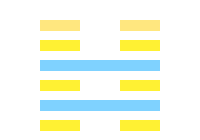52.2.4 (52 > 50)

52.2.4 (52 > 50) - THE KĂN HEXAGRAM.
- 2. The second line, divided, shows its subject keeping the calves of his legs at rest. He cannot help (the subject of the line above) whom he follows, and is dissatisfied in his mind.
- 4. The fourth line, divided, shows its subject keeping his trunk at rest. There will be no error.
52.2.4 (52 > 50) - Stop
One avoids making special efforts even though this is a recognised personality.
Bing DeepL Google Yandex52.2.4 (52 > 50) - Stop
One avoids making special efforts even though this is a recognized personality.
Bing DeepL Google Yandex52.2.4 (52 > 50) - Kán, l’arrêt
Kán : ferme, tenir droit, bien réglé, arrêter, reposer
-
2. « Arrêter le mouvement des jambes ». (Ou les tenir droites et bien posées.) Si, devant s’arrêter, on ne peut aider celui qui marche devant soi, on doit en avoir du déplaisir.
On doit aider et se rendre au cri d’appel. - 4. Tenir le corps droit et ferme, c’est une bonne manière. [On doit tenir le corps entier tout droit.] (Répétition du § 3 pour en avoir six. Tenir le corps droit est un principe essentiel des rites chinois.)
52.2.4 (52 > 50) - Cesser
On évite de faire des efforts particuliers bien qu'il s'agisse d'une personnalité que l'on a reconnue.
Bing DeepL Google Yandex52.2.4 (52 > 50) - Megállás
- 2. Ha a másik többet akar, nem tarthatja vissza.
- 4. Megáll, de mások folytatják.
The trigrams
The trigrams are combinations of three yin and yang lines. The three bottom lines of the hexagram form the lower trigram and represent the inner situation. The three top lines form the upper trigram and represent the outer situation.
Upper trigram: The mountain The fire


Lower trigram: The mountain The wind


The formation: 52
What is already there

52 - THE KĂN HEXAGRAM.
When one's resting is like that of the back, and he loses all consciousness of self; when he walks in his courtyard, and does not see any (of the persons) in it, there will be no error.
Bing DeepL Google Yandex52 - Stop
One recognizes that it is time to stop because one needs to feed oneself.
Bing DeepL Google Yandex52 - Stop
One recognizes that it is time to stop because one needs to feed oneself.
Bing DeepL Google Yandex52 - Kán, l’arrêt
Kán : ferme, tenir droit, bien réglé, arrêter, reposer
Kan « ferme ». L’homme ferme tourne le dos et s’oppose résolument, sans tenir compte de lui-même. S’il traverse un endroit, il ne regarde pas qui y est et ne faillit point.
Texte
L’homme ferme s’oppose résolument (au mal) sans tenir compte de lui-même. Devant traverser un endroit, il ne regarde pas qui s’y trouve (mais le fait résolument) et ne faillit point.
Symbolisme
Deux montagnes superposées forment le Koua. Ainsi l’homme supérieur pense à ne pas dépasser les bornes de ses fonctions.
Commentaire
Kán signifie s’arrêter, tenir ferme, en bon ordre, agir ou s’arrêter selon l’occasion. Quand l’acte et sa cessation ont lieu en temps convenable, la conduite est belle et intelligente. « Rester à sa place », cela veut dire que les grands et les petits sont en rapport, mais sans usurpation ni entre-croisement. Celui qui est ferme et attentif à son devoir ne se recherche pas lui-même. Marchant dans son jardin, il ne voit pas même qui s’y trouve.
Note. Tout ceci illustre le sens « tenir droit, bien réglé » et se réfère aux rites du maintien extérieur qui prescrivent de se tenir toujours droit et de ne pas même s’asseoir sur un siège qui n’est pas droit.
52 - Cesser
On reconnaît qu'il est temps de s'arrêter car on a besoin de s'alimenter.
Bing DeepL Google Yandex52 - Megállás
Felismeri hogy itt az ideje megállni mert a többieket táplálni kell.
Bing DeepL Google Yandex
52.2 (52 > 18) - THE KĂN HEXAGRAM.
The second line, divided, shows its subject keeping the calves of his legs at rest. He cannot help (the subject of the line above) whom he follows, and is dissatisfied in his mind.
Bing DeepL Google Yandex52.2 (52 > 18) - Being attracted irresistibly
The other wants more, one cannot hold them back.
Bing DeepL Google Yandex52.2 (52 > 18) - Being attracted irresistibly
The other wants more, one cannot hold them back.
Bing DeepL Google Yandex52.2 (52 > 18) - Kán, l’arrêt
Kán : ferme, tenir droit, bien réglé, arrêter, reposer
« Arrêter le mouvement des jambes ». (Ou les tenir droites et bien posées.) Si, devant s’arrêter, on ne peut aider celui qui marche devant soi, on doit en avoir du déplaisir.
On doit aider et se rendre au cri d’appel.
52.2 (52 > 18) - Être attiré irrésistiblement
L'autre en veut plus, on ne peut pas le retenir.
Bing DeepL Google Yandex
52.4 (52 > 56) - THE KĂN HEXAGRAM.
The fourth line, divided, shows its subject keeping his trunk at rest. There will be no error.
Bing DeepL Google Yandex52.4 (52 > 56) - Kán, l’arrêt
Kán : ferme, tenir droit, bien réglé, arrêter, reposer
Tenir le corps droit et ferme, c’est une bonne manière. [On doit tenir le corps entier tout droit.] (Répétition du § 3 pour en avoir six. Tenir le corps droit est un principe essentiel des rites chinois.)
Bing DeepL Google YandexIn the making: 50
What is poised to happen

50 - THE TING HEXAGRAM.
Ting gives the intimation of great progress and success.
Bing DeepL Google Yandex50 - T’ing, le chaudron
T’ing : chaudron à trois pieds, vase du sacrifice, sacrifice.
Ko « vase à cuire (pour le sacrifice), symbole d’un principe heureux et d’un développement avantageux ». Les saints cuisaient les offrandes pour honorer Shang-ti et faisaient de grandes fêtes pour entretenir les saints et les sages.
Texte
Le chaudron est un symbole de principe heureux ; de développement prospère.
Symbolisme
Le feu entrant dans le bois figure « cuire ». Le sage garde sa dignité et maintient son destin céleste.
Commentaire
Les saints cuisaient leurs offrandes pour honorer Shang-ti et faisaient de grands festins pour entretenir les hommes saints et sages.
La docilité et la finesse d’ouïe, la clarté de la vue chez le faible qui progresse et s’élève, qui garde le milieu, obéit au puissant et s’accorde avec lui, tout cela donne la prospérité et le succès.
The nuclear hexagram: 40.1.3.5 (40 > 43)
The nuclear hexagram is the association of the two inner trigrams (lines 2,3,4 and 3,4,5). It represents the root, or the origin of the situation.

40.1.3.5 (40 > 43) - THE KIEH HEXAGRAM.
- 1. The first line, divided, shows that its subject will commit no error.
- 3. The third line, divided, shows a porter with his burden, (yet) riding in a carriage. He will (only) tempt robbers to attack him. However firm and correct he may (try to) be, there will be cause for regret.
- 5. The fifth line, divided, shows (its subject), the superior man ( = the ruler), executing his function of removing (whatever is injurious to the idea of the hexagram), in which case there will be good fortune, and confidence in him will be shown even by the small men.
40.1.3.5 (40 > 43) - Contemplating one's mistake
One recognises deep down inside that others have said the truth.
Bing DeepL Google Yandex40.1.3.5 (40 > 43) - Contemplating one's mistake
One recognizes deep down inside that others have said the truth.
Bing DeepL Google Yandex40.1.3.5 (40 > 43) - Kieh, la libération
Kieh : 1. Délivrer, faire échapper, échapper au danger ; 2. Disperser ; 3. Ouvrir, séparer, s’ouvrir. Se dit du mouvement de la germination. 4. Résoudre une difficulté, une complication.
-
1. Délivrer quelqu’un est chose excellente.
Quand le fort et le faible s’entendent selon la justice, il n’y a pas de faute à craindre. -
3. Si un porteur se met dans un char et qu’il survienne des voleurs, il sera attaqué et échappera difficilement ; s’il abandonne sa charge, il pourra se sauver.
Pour un porteur, aller en char est honteux ; c’est attirer sur soi les voleurs.
Il n’appartient pas à des gens du commun d’aller en char . - 5. C’est au sage d’écarter (les maux) et de résoudre (les difficultés) ; s’il y réussit, il gagnera la confiance du vulgaire.
40.1.3.5 (40 > 43) - Contempler son erreur
On reconnaît en son for intérieur que les autres ont dit la vérité.
Bing DeepL Google Yandex40.1.3.5 (40 > 43) - Módosítás
- 1. Fel akarja szabadítani magát, ez egy jó döntés.
- 3. Ha valaki elhanyagolja, másoknak adja.
- 5. Csak egy alkalmas személy tudja megmutatni a megoldást.
Ruler
The starting situation

52.4 (52 > 56) - THE KĂN HEXAGRAM.
The fourth line, divided, shows its subject keeping his trunk at rest. There will be no error.
Bing DeepL Google Yandex52.4 (52 > 56) - Kán, l’arrêt
Kán : ferme, tenir droit, bien réglé, arrêter, reposer
Tenir le corps droit et ferme, c’est une bonne manière. [On doit tenir le corps entier tout droit.] (Répétition du § 3 pour en avoir six. Tenir le corps droit est un principe essentiel des rites chinois.)
Bing DeepL Google YandexCorrection
The direction where the ruler is going to bend

52.2 (52 > 18) - THE KĂN HEXAGRAM.
The second line, divided, shows its subject keeping the calves of his legs at rest. He cannot help (the subject of the line above) whom he follows, and is dissatisfied in his mind.
Bing DeepL Google Yandex52.2 (52 > 18) - Being attracted irresistibly
The other wants more, one cannot hold them back.
Bing DeepL Google Yandex52.2 (52 > 18) - Being attracted irresistibly
The other wants more, one cannot hold them back.
Bing DeepL Google Yandex52.2 (52 > 18) - Kán, l’arrêt
Kán : ferme, tenir droit, bien réglé, arrêter, reposer
« Arrêter le mouvement des jambes ». (Ou les tenir droites et bien posées.) Si, devant s’arrêter, on ne peut aider celui qui marche devant soi, on doit en avoir du déplaisir.
On doit aider et se rendre au cri d’appel.
52.2 (52 > 18) - Être attiré irrésistiblement
L'autre en veut plus, on ne peut pas le retenir.
Bing DeepL Google Yandex
